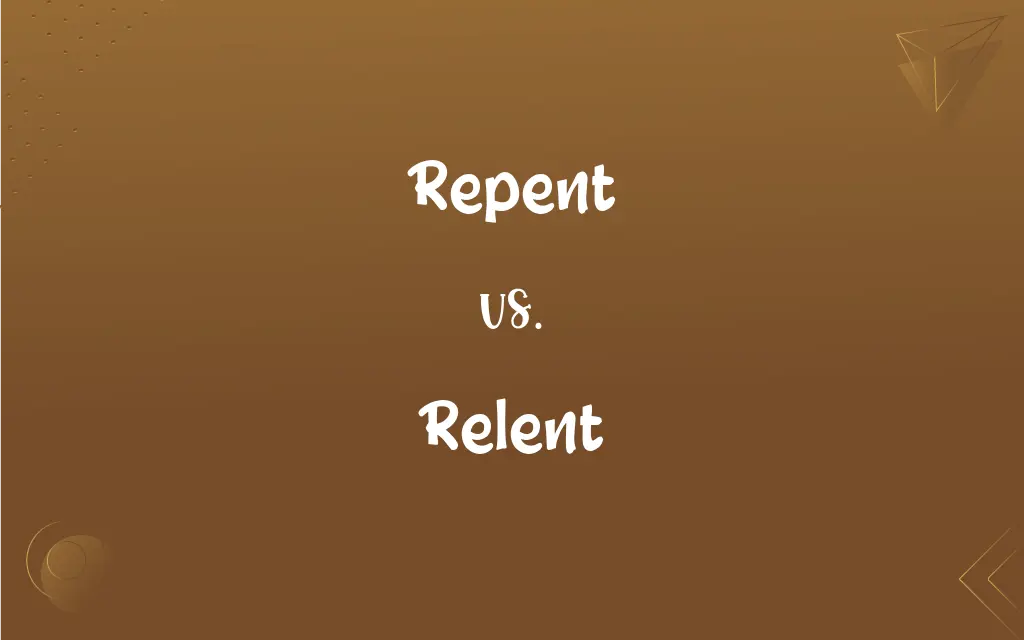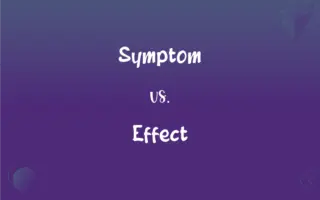Repent vs. Relent: What's the Difference?
Edited by Aimie Carlson || By Harlon Moss || Updated on February 5, 2024
Repent means to feel remorse or regret for one's actions, while relent means to become less severe, harsh, or strict.

Key Differences
Repentance and relenting are distinct concepts with unique implications for behavior and attitude. To repent involves a deep sense of remorse or regret for one's actions or sins, often accompanied by a commitment to change one's ways. It is an inward process, reflecting a personal acknowledgment of wrongdoing and a desire to make amends. On the other hand, to relent involves softening one's stance or attitude, typically in response to someone else's pleas or circumstances. It is an outward expression of easing up on previously harsh demands or positions, indicating a shift in behavior towards leniency or compassion.
Repentance is deeply tied to moral and ethical considerations, often associated with religious or spiritual contexts, while relenting is more about flexibility and the willingness to compromise or let go of rigidness. Repenting requires a person to confront their own conscience and seek forgiveness, either from themselves, others, or a higher power. Relenting, however, does not necessarily involve guilt or moral reflection; instead, it focuses on changing one's approach or decision in response to external factors or appeals for mercy.
The process of repentance can lead to profound personal transformation and renewal, as it calls for sincere reflection on one's actions and their impact on others. It embodies a desire to improve oneself and to align more closely with ethical or spiritual values. Conversely, relenting can foster reconciliation and understanding between parties, as it shows a willingness to listen, empathize, and adjust one's actions for the sake of harmony or relief. It can ease tensions and resolve conflicts by demonstrating flexibility and compassion.
In literature and discourse, the themes of repentance and relenting are explored to highlight characters' development and the dynamics of power and forgiveness. Stories of repentance often focus on redemption arcs, where characters seek to atone for their past and earn forgiveness. Stories that feature relenting, however, might concentrate on the thawing of relationships or the softening of hearts, showcasing the impact of empathy and kindness in altering outcomes.
Understanding the nuances between repenting and relenting enriches our comprehension of human behavior and interactions. Repentance speaks to the personal journey of remorse and redemption, focusing on internal change and moral accountability. Relenting speaks to the interpersonal dimension of adjusting one's stance, often leading to softened interactions and mitigated conflicts. Both processes, though different in nature, play vital roles in fostering growth, understanding, and reconciliation.
ADVERTISEMENT
Comparison Chart
Definition
Feeling remorse or regret for one's actions.
Becoming less severe, harsh, or strict.
Context
Moral, ethical, often spiritual.
Interpersonal, situational.
Focus
Internal reflection and remorse.
External behavior and attitude change.
Outcome
Personal transformation and seeking forgiveness.
Easing of tensions and conflict resolution.
Associated with
Moral accountability and personal change.
Flexibility, compassion, and compromise.
ADVERTISEMENT
Repent and Relent Definitions
Repent
To change one's mind or purpose.
She repented her decision too late.
Relent
To soften in feeling, temper, or determination.
The storm finally relented near dawn.
Repent
To return to a right state of mind.
He repented and mended his ways.
Relent
To give in or yield to something.
After hours of begging, she relented and let her son go to the concert.
Repent
To feel sorrow for past conduct.
He repented for his harsh words.
Relent
To become more lenient or compassionate.
He relented and allowed them extra time to complete the project.
Repent
To express regret for sins or wrongs.
They repented and sought forgiveness.
Relent
To ease up or slacken.
The teacher relented on the homework for the weekend.
Repent
To resolve to amend one's life.
After much reflection, she repented and turned over a new leaf.
Relent
To abandon harsh intentions or harshness.
Seeing their distress, he relented and offered help.
Repent
To feel remorse, contrition, or self-reproach for what one has done or failed to do; be contrite
"[He] liked to visit prisoners and admonish them to repent of their ways" (Adam Hochschild).
Relent
To become more lenient, compassionate, or forgiving.
Repent
To feel such regret for past conduct as to change one's mind regarding it
Repented of intemperate behavior. You'd better accept their offer before they repent.
Relent
To become less severe or intense; slacken
The storm finally relented.
FAQs
What does it mean to relent?
To relent means to become less strict or severe, often as a response to someone else's arguments or requests.
Can repentance lead to forgiveness?
Yes, repentance is often a step towards seeking and receiving forgiveness from others or oneself.
Is relenting a sign of weakness?
Not necessarily; relenting can be a sign of compassion, understanding, and the ability to adjust one's stance.
Can someone relent without being asked?
Yes, one can choose to relent on their own, deciding to become less severe or harsh without external prompting.
How do repentance and relenting differ?
Repentance is about internal remorse and moral reflection, while relenting is about softening external attitudes or decisions.
Do all religions involve repentance?
Many religions involve concepts of repentance as a way to seek forgiveness and improve oneself, but practices and beliefs vary.
What are the effects of not relenting?
Not relenting can lead to ongoing conflicts, strained relationships, and missed opportunities for resolution.
Is repentance always related to sin?
In religious contexts, repentance is often related to sin, but more broadly, it can involve regret for any wrong actions.
What does it mean to repent?
To repent means to feel sincere remorse or regret for one's actions and to resolve to change one's behavior.
Can one repent without confessing?
Yes, one can repent internally without publicly confessing, though confession may be part of some religious practices of repentance.
How can one show they have repented?
Actions reflecting change, making amends, and expressing sincere remorse are ways to show repentance.
How is repentance depicted in literature?
In literature, repentance is often depicted as a pivotal moment of character development and moral awakening.
Can organizations or entities repent?
Organizations can express repentance through official apologies, policy changes, and reparative actions.
How do children learn to relent?
Children learn to relent through guidance, understanding empathy, and observing acts of kindness and compromise.
Why might someone refuse to relent?
Pride, stubbornness, or a belief in the righteousness of their stance might prevent someone from relenting.
What historical examples exist of public repentance?
Historical examples include public apologies from leaders or institutions for past wrongs or injustices.
How can one encourage others to relent?
Encouraging others to relent can involve dialogue, empathy, presenting compelling reasons, and showing the benefits of flexibility.
Can relenting change the outcome of a situation?
Yes, relenting can lead to more positive outcomes by allowing for compromise, reconciliation, and healing.
Is there a physical act of repentance?
Physical acts of repentance can include gestures of humility, acts of charity, or other deeds meant to amend past wrongs.
Can repentance affect mental health?
Repentance can positively affect mental health by alleviating guilt and fostering a sense of peace and renewal.
About Author
Written by
Harlon MossHarlon is a seasoned quality moderator and accomplished content writer for Difference Wiki. An alumnus of the prestigious University of California, he earned his degree in Computer Science. Leveraging his academic background, Harlon brings a meticulous and informed perspective to his work, ensuring content accuracy and excellence.
Edited by
Aimie CarlsonAimie Carlson, holding a master's degree in English literature, is a fervent English language enthusiast. She lends her writing talents to Difference Wiki, a prominent website that specializes in comparisons, offering readers insightful analyses that both captivate and inform.































































